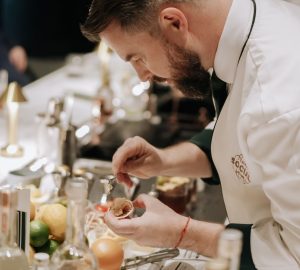JERRY and Small Batch Learning bring training to your smartphone, as scale and sophistication demand industry change. By Dan Bignold.
This year, the launch in Asia of two new training platforms for beverage service heralds some much-needed modernisation for the regional hospitality industry. First JERRY, created by alcohol distributor and bar creator Proof & Company, which began testing its first groups at the end of last year; and then Small Batch Learning, which will accept students from September onwards.
Combining up-to-date content, created by recognised experts in the contemporary industry, with technology to make the training accessible online, both platforms are addressing the significant evolutions in the regional industry over the last 10 years ago – namely scale and sophistication – that have left traditional staff training models redundant.
For JERRY, the platform was an organic response to Proof’s own client demands for more training. “Almost every bar project we’ve done, clients wanted and needed education,” says JERRY’s head of education Nicole Smith. “We found that often we would spend time and do intensive training, but when we left there was always this question mark of whether the training would continue – will it be reinforced?”
That’s an age-old issue with training when it relies on in-house teams to deliver. “Training is too often seen as a privilege, not a right,” says Adam Leibrandt, founder of Small Batch Learning. “It’s too often seen as a ‘nice to have’, because it’s difficult to execute – rounding up staff face-to-face, making it relevant – so it doesn’t get done enough.”
Taking training online is one way to break down some of those barriers: better accessibility for individual staff; easier to organise; and – through testing and progress reporting – easier to monitor for managers. The shift also, most importantly, guarantees accurate, relevant and consistent knowledge for large organisations facing an unprecedented demand to build a new bartending workforce from scratch.
Training is too often seen as a privilege, not a right
Blake Walker, director of beverage for Asia Pacific at Marriott International, explains the problem. “We already use online training because of our scale, and we’re likely to use it even more in the future. We’ve already got 630 properties in Asia Pacific, with 5,000 bartenders. But we’ll be up to 1,000 hotels by 2020. So we need it. We can’t just expect people to learn from the person next to them, because that person is often just as green as they are.”
It’s not just numbers driving the change. After 100 years of cocktail drinkers mostly being happy with slight variations on existing classics, bartenders of the last decade have started a revolution, infusing whisky with bacon one day, rotary evaporating goat’s milk the next – flourishes which in turn feed back into customer expectation.
“The biggest factor why bartender education needs modernising is customer engagement and their thirst for craft,” says Indra Kantono, owner of the Jigger & Pony Group in Singapore. “The format of modern bars, with less emphasis on music entertainment and visual razzle-dazzle, means cocktails and bartender craft get put front and centre. Bartenders have to able to showcase their knowledge in a way that delights the customer.”
Such rapid change brings its own dangers for recruits and managers alike. “The industry is evolving and bartenders are watching Youtube to pick up new ideas, but there needs to be correct training so people understand why they’re using these techniques,” says Walker. “There’s no point smoking a Martini if the Martini already tastes bad, because the smoke will just make it taste worse.”
Which is why Kantono sees new third-party training providers more as an accessory to Jigger & Pony’s own apprenticeship program, to provide a foundation so managers can focus more on the sophisticated end of the skillset. “It could complement our own program,” says Kantono. “Each bar is unique, but a higher base from which to start off the apprenticeship would speed up the growth of our bartenders.”
Ultimately it’s that foundation education which training providers are addressing. Another course, which landed four years ago in China from Bacardi, called The Fellowship, was created to plug an education void as the local scene began to blossom. “The bartenders wanted to learn more, but especially at the time, there wasn’t very much material in Mandarin, so it was difficult for people to read if they didn’t speak English – and what did exist was questionable in terms of research and history,” says Adam Devermann, Bacardi’s associate director for advocacy, Greater China, who also wrote the course. Currently The Fellowship is only delivered by the company’s own brand ambassadors (and only in China), but there are plans to take it online.
We can’t just expect people to learn from the person next to them, because that person is often just as green as they are
The knowledge gap isn’t felt only in countries where cocktail culture is newly developing, however. “What we found is that by focusing our content on being straightforward, originally to target these emerging economies, operators who we talked to in developed economies also had the same problem – that their staff were nowhere near where they needed to be,” says Leibrandt. That’s a global problem for the bar industry, with bartending in many ways the last frontline hospitality job to professionalise. While hotel schools and cookery colleges have long provided a clear path to the vocational skills needed for front of house or kitchen teams, for most people who end up behind the bar, they learn on the job.
None of these providers or operators, though, particularly thinks formal qualifications are an essential next step for bartenders. “We don’t want to lock anyone into a corner, saying that ‘You have to know this’,” says Devermann. “One of the great things about the bartender industry is the creativity behind it – the different ways of doing things, the different approaches, the borrowing from other industries. So I think qualifications or accreditation could be great for that base understanding, as long as we’re not stifling creativity.”
Leibrandt senses another reason not to get hung up on industry-recognized qualifications. “Setting standards sounds great on paper, but it cannot be to the detriment of the real goal – impact on customer experience,” he says. “Right now, there’s too large of a gap; right now, we don’t even have set standards for using a jigger. We’re so far behind the culinary industry that it sounds romantic to aim for a standard just yet.”
But in this absence of agreed qualifications, staff more than ever need employers to formalise their own training programs – and employers need to step up. Because in a growing industry, where good beverage professionals (and not justbartenders) are in demand, proper provision of education could be the easiest way to create and retain key personnel. “Good education provides the right opportunities within organisations so they can keep their best team members,” says Smith.
And for any operator who still isn’t convinced that it’s all worth the hassle or cost, then Kantono offers another angle: “What happens if you don’t train them, and they stay?”
JERRY
What is it: Modern beverage education from Proof & Company. Each venue or organisation gets a personalised website, which the JERRY team loads with courses relevant to their needs. JERRY’s head of education Nicole Smith works with a group of JERRY Professors, which includes Proof’s stable of experts, as well as big bar community names like Charlie Ainsbury, Dean Callan, Michael Callahan, Yugnes Susela, Eddy Yang, Monica Berg and Agung Prabowo, to name a few. At its public launch in May, the library already boasted over 90 courses, delivered in 30-minute online lessons that can then be reinforced through a class by the organisation’s own in-house JERRY champion. It’s already being used by clients in 11 countries including JIA Group in Hong Kong, Employees Only Singapore, ATLAS Bar Singapore and Four Seasons Resorts Maldives. A subscription service for individuals will be launching this September.
What they say: “JERRY provides holistic online education to f&b teams. Aside from JERRY curriculum, the platform allows managers to author their own courses complete with videos, testing, tracking and more. It really is the most flexible online education technology there is, allowing f&b venues a paperless training system that is accessible, anytime, anywhere and from any device,” explains JERRY’s Nicole Smith.
How it’s priced: Memberships are priced at USD250 per learner per year (for small teams of up to 20 learners), with discounts available to bigger teams on enquiry.
Contact: www.jerry.global.
Small Batch Learning
What it is: A free, hospitality-specific LMS (Learning Management System), which hospitality operators can use to train, communicate with, and track the development of staff worldwide. Small Batch is viable for single venues all the way up to multi-venue (and multi-language) groups. Importantly Small Batch acts as an aggregator: the platform can host both SBL training content and, through its Virtual Menu section, product training from brands. Moreover, it can also become an intranet for individual operators (or even other third-party providers), where they can upload their own pre-approved internal training content, which can be combined with SBL and brand content to create tailored courses, available to private staff networks. All training can be tested and tracked, with insights shared back to management.
What they say: “Our opinion is that existing training is too focused on the top 10 per cent of venues,” says founder Adam Leibrandt. “There’s too much attention to this concept of exceeding expectations. But we still see a gap between the actual customer experience and perceived customer experience in the eyes of the venue. So we want to deliver that foundation.”
How it’s priced: The platform will be free to use for operators (it’s launching in September 2018). Instead, revenue is generated through alcohol brands, where product training is delivered through the “Virtual Menu” and charged by targeting relevant bartenders on a pay-per-trained basis.
Contact: hello@smallbatchlearning.com.
The Fellowship
What is it: Three-module training course, starting with spirits knowledge and cocktail-making, progressing into the venue- and people-management skills required to become a supervisor or bar manager. The program was created by Bacardi, so introductions to the company’s brand portfolio are to be expected, but there is also plenty of neutral category education. The program is delivered face-to-face for individual teams at their bars by Bacardi’s brand ambassadors, but the company has also built a bespoke Fellowship training classroom in downtown Shanghai. Each of the three modules takes three days to complete.
What they say: “As a company we have this great base and depth of knowledge to share. But at the same time The Fellowship is not about selling our products in,” explains The Fellowship’s Adam Devermann.
How it’s priced: Because (for now) the modules are only delivered face-to-face in China, Bacardi has to limit the number of bars that can participate, meaning the Fellowship is available to partner outlets only.
Contact: Local Bacardi reps in China.








